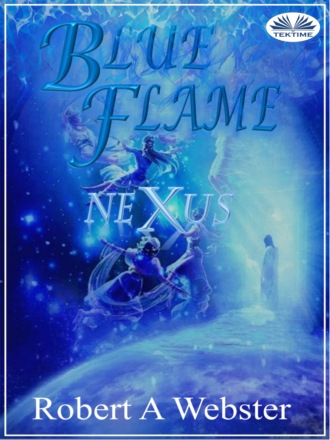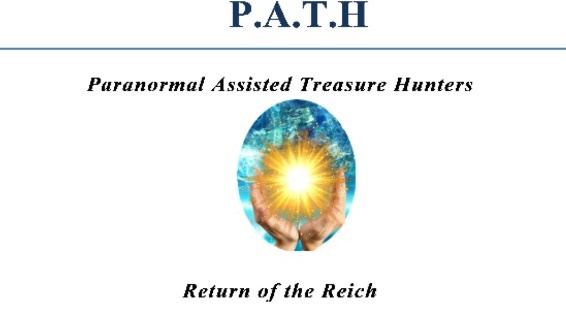
Полная версия
Blue Flame


Copyright © 2020 by Robert A Webster
All rights reserved. No part of this publication may be reproduced, stored or transmitted in any form or by any means, electronic, mechanical, photocopying, recording, scanning, or otherwise without written permission from the publisher. It is illegal to copy this book, post it to a website, or distribute it by any other means without permission.
Robert A Webster asserts the moral right to be identified as the author of this work.
First edition

Table of Contents
Part One
1
If you tell a big enough lie and tell it frequently enough, it will be believed
2
If you want to shine like the sun, first you have to burn like it.
3
Things are not always right because they are hard, but if they are right one must not mind if they are also hard.
4
For there is one thing we must never forget; the majority can never replace the man.
5
The man who has no sense of history, is like a man who has no ears or eyes
6
The true guide of life is to do what is right.
7
If you’re going through hell, keep going.
8
You never can tell whether bad luck may not after all turn out to be good luck
9
Life doesn’t forgive weakness.
10
Never deprive someone of hope; it may be all they have
11
Mankind grew strong through eternal struggle; it follows that he shall perish through eternal peace
12
God’s and beasts, that is what our world is made of
13
Anyone can deal with victory. Only the mighty can bear defeat
14
The price of greatness is responsibility over each of your thoughts
15
If freedom is short of weapons, we must compensate with willpower
16
Courage is what it takes to stand up and speak; courage is also what it takes to sit down and listen.
17
Words build bridges into unexplored regions
18
Difficulties mastered are opportunities won.
19
To improve is to change, so to be perfect is to have changed often.
20
It is a fine thing to be honest, but it is also very important to be right
21
Epilogue
23
In the not too distant future
24
Awakening
25
Revelation
26
If the oceans die, we die. We can’t live on this planet with a dead ocean
27
The New Frontier
28
There’s money to be made by driving a species extinct
29
There is no such thing as sustainable seafood in a dying ocean
30
Bad actors make convincing politicians
31
Lesson 1: Greed stops the ability of a species to live in harmony with its environment
32
Death is a great Equaliser
33
Life is a terminal illness
34
Technology is a useful servant but a dangerous master
35
There is Friendship in the heart of danger
36
Arrogance is knowledge without wisdom
37
There is no such thing as a foolproof plan if there are fools about
38
When love kills love
39
Lesson 2: Technology nurtures the human race
40
You need a crime, a detective, and the solution.
41
Love can start with an unexpected hello
42
Everything is an illusion
43
Into the Belly of the Beast
44
There is nothing more deceptive than an obvious fact
45
Never attempt to win by force what can be won by deception
46
Lesson 3: Faith is a commodity easily bought
47
Revelation 2
48
Awakening 2
49
— Next —
50
Appendix
About the Author
Also by Robert A Webster

1
If you tell a big enough lie and tell it frequently enough, it will be believed
Total devastation surrounded the solitary figure. Bombed-out buildings and semi-submerged wrecks of a decimated fleet were all that remained of a navy that once dominated the oceans. The man stood at the end of a concrete jetty, lost in his thoughts with his hands clasped behind his back. His weary features and silver hair made him appear far older than his fifty-six years as he gazed at the ocean, cursing under his breath. With the rumble of explosions in the distance, he inhaled, filling his lungs with tarnished, salty sea air.
* * *
Several hours earlier, the dockside swarmed with military personnel. Throughout the night they had unloaded boxes and crates from trucks, sweating and swearing as they struggled to load them onto a sleek black U-boat by moonlight. Having to run for cover occasionally as the now familiar drone of Merlin engines roared overhead, dropping their deadly payloads around them.
With their job now done, the soldiers, sapped of their strength, murmured as they clambered aboard the trucks and then driven away. The smell of cordite lingered, along with a film of oil and diesel fuel that covered the water’s surface inside the harbour.
The dockside was now quiet, with a few of the U-boat’s crew and a handful of black-uniformed SS officers milling around the gangway.
The senior officer received a call through his portable field telephone and he barked out orders. Activity resumed as SS soldiers with machine guns rounded up the U-boat’s crew and ushered them aboard the vessel, while the senior SS officer and two junior officers remained on the dockside.
The hatches closed and the three SS officers went to the foot of the gangway. A black Mercedes 770-K with darkened windows pulled up beside them and the junior officers opened the vehicle’s doors. They snapped to attention as a man and woman stepped out.
The man ignored the SS soldiers and headed along the jetty. The young officers glanced wide-eyed at each other while the woman spoke to the senior SS officer.
“Let’s leave him for a while, Hans; this could be the last time he will see his beloved country.”
Hans Kruger, the senior SS officer, clicked his heels together and nodded to confirm the woman’s request. They watched the man ranting to himself as he strode up the jetty. Hans then ordered the junior SS officers to escort the woman to join the man on the jetty.
Hans watched them walk a short distance. He then took out his pistol and, hiding it behind his back, marched over to the Mercedes and tapped on the driver’s window. The driver, looking at the grinning SS officer, wound down the window and Hans shot him in the head. Holstering his smoking Luger, Hans then went over to wait at the foot of the gangway.
The man had remained undisturbed until the sound of strident footsteps approaching broke his train of thought as the woman stopped behind him, placing a comforting hand on his shoulder. He smelled her familiar reassuring fragrance as she said in a soft voice, “They’re ready to leave.”
He turned and smiled at the woman. The two young officers who accompanied her snapped to attention, raised an arm in salute, and stared ahead to avoid eye contact with the man, who gazed once more at the hills and countryside surrounding the crater-filled and demolished buildings of the once-great dockyard. The rusted and twisted metallic hulks that strewn around the harbour were the corpses of a once-proud fleet. Tears welled up in his eyes, knowing that he would never return. Composing himself, he walked with the woman by his side. They strode past the escorts, who fell in behind them and marched toward the large black U-boat, moored at the centre of the partly destroyed jetty. The vessel gently rolled from side to side, moved by rippling waves of the gentle spring tide.
The group walked up to the foot of the U-boat’s gangway and stopped in front of Hans.
“Everything set?” the man asked.
Hans snapped to attention, confirming that everything was going according to plan, with the crew detained for now in the forward compartment. The man glanced at the car parked several yards away. He again addressed the officer. “Well done, SS-Oberfüehrer. What about the other matter?” he asked. The officer then removed a photograph from his pocket and handed it to him. He stared at it for a few moments and then gave it to the woman, who, after glancing at the photo, smiled and put the picture in her handbag.
“Very well… Let’s get underway,” said the man and walked up the gangway with the woman at his side. Without turning back, they headed inside the side hatch of the conning tower.
SS-Oberfüehrer Hans Kruger was a tall, well-built man. He had a domineering presence who commanded both respect and fear. Although a commando, his real forte was far more sinister. He only took his orders from two men: his boss, SS-Gruppefüehrer Heinrich Muller, head of the feared Gestapo, and the man who had just entered the U-boat.
Hans remained on the dockside and marched over to the two escort officers.
“You served the Fatherland well. Your families will be proud of you.”
The two young officers stood erect and motionless. Hans removed his Luger from its holster, placed the barrel against the forehead of one young officer, and fired a shot between his eyes, killing him instantly. The other soldier urinated but remained motionless; his eyes squinted under the rim of his black peak cap before his end came.
Hans dragged the lifeless bodies over to the parked car one at a time, dumping them onto the back seat. He removed a container of diesel from the car’s boot and doused the flammable mix over the corpses and the car. He stood back and threw in a lit match and as the flames spread, Hans strode up the gangway into the vessel.
The U-boat became a hive of activity, as submariners came out of the hatchways and cast off the mooring lines. The Captain and several of his submariners went onto the conning tower bridge, where the Captain gave orders to the deck crew to make ready to shove off. It was a well-orchestrated routine, carried out and performed many times by this experienced and battle-hardened crew. The submariners, after completing their tasks, headed back inside the vessel. Having experienced war in all its savagery, the crew ignored the blazing Mercedes as they readied the vessel for sea.
The U-boat slewed away from the jetty, heading toward the mouth of the small port of Farge estuary. The vessel sailed out of the harbour and, like a sleek whale, eased its way into open water.
Apart from the Captain, the conning tower crew went below decks. Korvettenkapitän Karl Viktor watched as the vessel picked up speed, leaving his country in its wake. An explosion echoed from the jetty as the diesel ignited the Mercedes fuel tank, blowing it and its dead occupants to smithereens.
Captain Viktor stroked the black rubber coating of the conning bridge and listened to the battery banks whirring as they reached 17 knots. He watched the bow as the sleek vessel cut through the water, and he looked back in anger at the land and black plumes of smoke in the distance. Hearing the rumble of explosions as the Allies pounded the nearby town, he thought, ‘this is truly a magnificent vessel. With a fleet of these *Elektroboote’s we could have won the war.’
He took off his cap to let the sea breeze blow across his head and looked at the gauges.
“Seven fathoms, sir,” said the Dive Officer over the intercom.
“Very well…Prepare to dive the boat and level out at four metres,” ordered the Captain.
“Yes sir,” said the Dive Officer and repeated the order to the control crew.
“Open main vents, rig out bow planes, and set down ten degrees,” ordered the Captain.
A sudden bustle of motion signalled the crew’s compliance.
“Bow planes set, sir,” confirmed the Dive Officer.
The Captain then gave the order.
“Dive the boat!”
Sirens wailed to alert the occupants that the U-boat was submerging. With plumes of water whooshing out of the ballast tanks, the Captain left the conning tower, closed the hatch behind him, and went down into the hot, cramped control room. He realised that they were transporting human cargo along with looted treasure, but unsure of whom.
The Captain hung on to the periscope until the U-Boat levelled off at four metres and then he went to check the gauges.
Hans came into the control room, sneering, as he smelled sweat and grease in the noisy confined section, he handed the Captain a sealed envelope.
“Here are your orders!” he snapped as the Captain opened the envelope and read its contents.
“It’s signed by the Füehrer,” said Hans, glaring at the Captain, who after reading his instructions knew that his vessel would no longer have any contact with the outside world.
The war-weary commander looked at Hans and then gave orders to the control room crew.
“Helmsman, starboard 15, steer 3-5-Zero. Down planes ten degrees, make our depth 15 metres.”
The helmsman repeated the order aloud and eased forward on the helm control.
The Captain smirked as Kruger lost his balance and grabbed onto a hot metal pipe, wincing as the boat made a gentle descent. Captain Viktor went to the U-boat’s intercom and ordered all officers’ to the wardroom. He went to his chart table, took out charts of their destination, and he and Hans Kruger left the control room, passing two SS soldiers in the communications cabin removing the U-boats radio.
The Elektroboote angled down, gliding under the cold grey North Sea.
*In Appendix
Type XX’s U-boats were also known as Elektroboote and the first submarines designed to operate entirely submerged.
2
If you want to shine like the sun, first you have to burn like it.
Ryan rushed over, shook the Keeper’s shoulders, and looking into his glazed eyes, yelled, “Church, Church… are you okay?”
Church squinted at Ryan and then around the room. He wiped vomit from around his mouth with his hand as his faculties returned. Composing himself, but appearing unaware of his surroundings, he put his cluttered desk in order.
Ryan stood back and watched as colour returned to Church’s ashen face and he stopped trembling. When Church appeared to be back to his normal self, Ryan said, “That was a powerful one boss. Pinky and I felt it in the living room.”
Church coughed as he focused on Ryan, and with a quake in his voice, replied, “That was the worst experience and the most powerful spirit that I have ever encountered.”
Ryan frowned as he glared at the mess in the portal room, “Who was it?” he asked.
The answer never came. The door swung open and a woman in her twenties with short blonde hair entered the room carrying two mugs. She went over to Church and Ryan.
“Are you okay, Church?” Pinky asked, sounding concerned as she handed both men a mug of tea and said, “Here drink this.”
“Thanks, but I need something stronger than tea, Pinky,” said Church, his hands trembling as he took the mug.
“I know, so I put a drop of Johnny Walker in it,” Pinky replied and smiled.
“Great!” exclaimed Ryan, who after slurping his tea winced
“Duh, not for you dopey,” said Pinky and chuckled. She then saw something in the corner of the room and gasped.
Church took a drink of his beverage. He felt the whisky hitting the back of his throat and caressing his oesophagus as it eased down, giving him a warm glow. Church exhaled, picked up his notepad, glanced at it, and then replaced it on the desk. Ryan picked up the pad.
Pinky went to the sink, brought over a damp flannel, and wiped Church’s face, while Ryan looked at Church’s notes and scratched his chin.
The PATH team gathered around Church’s desk with items strewn about the top, resembling the aftermath of a drunken Saturday night brawl.
After clearing his throat, Church said, “Right, team. It looks like we have our next assignment.”
Church righted his overturned laptop, checked it was okay, turned it on, and entered a password.
“Look, it scorched the wall,” said Pinky, pointing to the corner wall. “And looking at you boss, it did more than that, you look terrified. We knew it was serious after the air got cold before it felt sucked out of the living room,” she said, scowling.
“So who was it?” Ryan asked, and smirked, adding, “Ooh, is there lots of lovely treasure to be had, and why did you write your spirit notes in German? I can’t understand them.”
“Anybody we know?” Pinky asked.
“Granny Pearl never came, did she? I can’t smell Brussels sprouts,” said Ryan and then looked confused, “I can’t smell anything.”
Church took another slurp of his drink and with a quake in his voice said, “No Ryan, you won’t smell anything with this spirit.” He shuddered, took a deep breath, and continued, “And to answer your questions, then Yes, I imagine there’s a great deal of treasure, and no, Granny Pearl never appeared and that’s what’s scares me.”
Church leaned forward and typed on the laptop keypad.
“And the answers to your other question.” Church quivered, and said, “This individual was German, and do we know him? Oh, most definitely.”
Church paused as a face appeared on his laptop screen. He turned the computer screen around so that Ryan and Pinky could view the image and continued, “We all know of him. The entire world knew this character, who, according to Grandpa Jack was a bloody menace.”
Pinky and Ryan’ gasped when they stared at the image on the screen.
Church frowned and announced, “I can sense you both feel troubled. I am scared after my encounter with this powerful spirit.” Pinky and Ryan heard the nervousness in Church’s voice as they glared at the image in disbelief while Church studied his notes and scribbled certain portions of his text in English on another notepad. Ryan broke the silence.
“I don’t understand boss, why now?” He pointed to the screen and continued. “He’s been dead for over 60 years.”
Church looked up from his notes, leaned forward and said, “It was not only the fact of whom or what this individual was that worries me.” He tapped the face on the screen and continued, “We also need to be concerned about the recipient.”
Church slid his notepad over and showed a name he had circled on his notes to the inquisitive Pinky and Ryan.
There was a stunned silence as Pinky and Ryan stared at the screen and the name on the notepad.
Pinky leant forward, pointed at the screen, and asked, “What’s the connection and how was that possible?”
“I don’t know, that’s what we need to find out,” said Church tapping his fingers on the desk.
Church then frowned and through pierced lips told them, “This was not the first time one of these demons came to this portal.” Still shaking, he glanced at the pentagram painted on the wooden floor in the corner of the room and said, “I know of an encounter we had with a Diabolus at our portal centuries ago and a more recent encounter with another Diabolus in the spirit world years ago, which I believe was the same one that I just met.”
Puzzled, Ryan frowned and asked, “What’s a Diabolus?”
“I will explain later,” said Church, who went to the safe, took out a thick ancient leather-bound book, came back over, and placed it on the desk. “Let me decipher all my notes and read the journal again,” said Church, opening the book and searching through the brittle pages for the relevant section.
“I am not happy with this one, boss. Something doesn’t feel right. Do we have to take the assignment?” Ryan asked, fidgeting and looking at Pinky.
“Perhaps a cheese and ham sandwich would help,” smiled Pinky, trying to lighten the mood, knowing that Ryan would do anything if the reward involved food.
“Oh, well why didn’t you say that before?” chuckled Ryan, “When do we start?” he asked, with nervousness he tried to disguise.
Church looked at his team. After this powerful encounter and knowing what it was, he felt scared. He knew from the journal the dangers of any encounter with a Diabolus, and after what he’d just experienced, did not want to put them in harm’s way. Even though they looked calm, Church sensed fear in the pair and realised that none of them were ready for an assignment of this magnitude. He closed the book, leant on the desk, smiled, and announced, “Okay, we won’t take this case.”
“Phew,” Pinky sighed with relief.
Although pleased with Church’s decision, Ryan had a niggling doubt and asked, “Can we do that?”
Church reply never came, as a flickering blue flame filled the corner of the room along with a familiar aroma and, sniffing the air, Ryan announced. “I smell Brussels sprouts, Granny Pearl’s here.”
3
Things are not always right because they are hard, but if they are right one must not mind if they are also hard.
The PATH team lived in a 16th Century thatched-roofed cottage built in a clearing within a dense woodland area of Clifton Moor, close to York city. This secluded cottage belonged to Churchill Potts junior, who inherited it from his grandparents, Pearl and Jack Potts. The cottage had been in the Potts family for generations and although this quaint old cottage appeared like something from a Brothers Grimm folktale; it held a remarkable secret.
* * *
During the mid-sixteenth century, a wealthy Englishman, Robert Potts, had the cottage built at a specific secluded location. This was ideal for Robert and his family and perfect for the inhabitants of the surrounding towns and villages. The townsfolk felt certain Robert was a Warlock, so the further away he was, the better.
With England in turmoil after the civil war ended and after they beheaded Charles I, a Cromwell-controlled protectorate government, one with deep puritanical beliefs, now ran the country. The English people felt terrified and confused. This fear paved the way for a government-backed religious crusade to rid the country of those considered heretics, so witches and warlocks became an indoctrinated terror. This fear led to the formation of the ‘Witch Finders.’ These individuals scoured the country on high government salaries, flushing out evil forces that allegedly manifested into human form.






